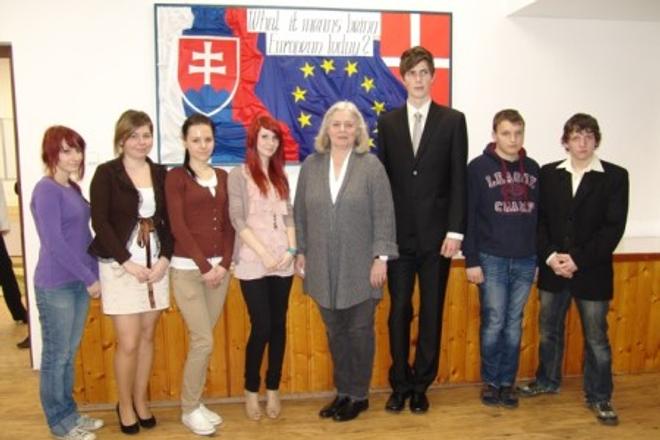DIPLOMACY has taken Anita Hugau on a lifelong journey from being a Dane, through being a Nordic and a European to becoming a world citizen. “In this interconnected world we are all world citizens, and this requires responsibility, but also gives us all enormous amounts of opportunity,” Hugau, Denmark’s ambassador to Slovakia, explained to students during a recent visit to a high school in Kráľovský Chlmec (Košice Region). She added that “these opportunities are easier to take up when you know other languages and they are easier to learn the younger you are”.
The ambassador, who first worked in Denmark, then in the Nordic countries, then in London, Brazil and Chile, from where she returned to Europe – to Slovenia – and then continued on her international mission to Slovakia, explored with the students what it means to be a European today when the European Union faces tough economic challenges.
“There is no doubt that the current economic crisis has put the European Union to the test,” said Hugau, adding that one way to address these hardships is the vision of cooperation and solidarity represented by the late Czech President Václav Havel. “We need to secure a Europe at work again. And together we will.”
Hugau, who early in her life saw modern Europe being formed, shared her life story and encouraged the students to study foreign languages and absorb foreign cultures so that the young generation is able to tackle the emerging challenges in the EU such as “the hardship of unemployment and limited job opportunities”.
The Danish ambassador met the students within the Bringing the World to the Classroom project developed by The Slovak Spectator, several foreign embassies in Slovakia and Sugarbooks, a distributor of textbooks.
In their essays the students made an effort to freshly examine their European identity and explored different advantages and challenges.
Géza Gazdag's essay spoke about the opportunity Slovak students have to study at famous universities across the continent and genuinely experience other traditions, something he said should generate respect for other nationalities.
“Maybe it is culture that connects us,” another student, Hélia Németh, pondered in her essay, suggesting that whenever “hatred incited by irresponsible politicians” enters relations between the majority and minorities, Europe faces serious problems. Picking up on this theme, Veronika Kissiova noted one of the slogans of the EU “united in diversity”, adding that whenever more diverse groups share one place conflicts emerge unless “patience” and mutual assistance is offered.
Edina Romanko found the sense of “belonging to a strong community” and “safety for smaller countries like Slovakia” to be one of the benefits of belonging to the EU, while Bence Szanyo said that when he thinks of Europe he envisions all the diversity of languages and traditions, adding that “I would like to travel, study and explore while still feeling as [if I were] at home”.
Anita Hugau also touched upon the fact that Denmark currently holds the rotating presidency of the European Union, adding that 40 years ago, Denmark was part of the first enlargement of the community; that 30 years ago Denmark held the presidency during the Cold War; that 20 years ago Denmark held the presidency at a time when the single market was being launched; and that 10 years ago it did so when the EU fulfilled its historic obligation and united Europe. Hugau concluded that her country now again aspires to “work hard to move Europe forward”.



 Ambassador Anita Hugau joins students. (source: red)
Ambassador Anita Hugau joins students. (source: red)